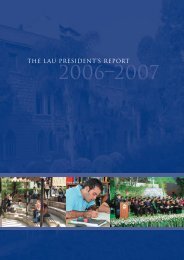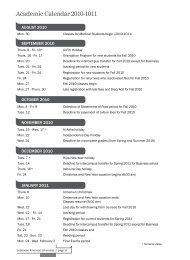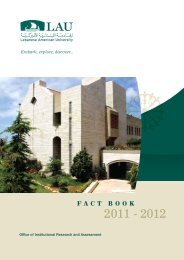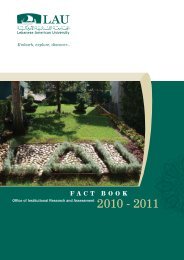academic-catalog2011.. - LAU Publications - Lebanese American ...
academic-catalog2011.. - LAU Publications - Lebanese American ...
academic-catalog2011.. - LAU Publications - Lebanese American ...
You also want an ePaper? Increase the reach of your titles
YUMPU automatically turns print PDFs into web optimized ePapers that Google loves.
Department of Computer Science and Mathematics<br />
classification, clustering, and association rules<br />
(spatial, temporal, and multimedia mining; web<br />
models), techniques and algorithms for mining<br />
the web based on its structure, content, and<br />
usage, and the scalable and distributed data<br />
mining algorithms.<br />
CSC725 System Simulation [3-0, 3 cr.]<br />
This course covers the model construction<br />
and simulation applied to problems taken<br />
from such diverse fields as economics,<br />
social science, communication networks and<br />
computer systems. It includes programming<br />
in simulation languages such as SIMSCRIPT,<br />
SIMULA or GPSS. Students will be able to<br />
analyze a problem, and determine whether<br />
simulation techniques could be used to solve it.<br />
Students are also required to develop a viable<br />
model of the system program, and to execute a<br />
computer simulation of the model, and finally<br />
analyze the results of the simulation.<br />
CSC726 Compilers [3-0, 3 cr.]<br />
This course covers the design and<br />
implementation of compilers for high-level<br />
languages. Topics include lexical and syntactic<br />
analysis, parsing techniques, top-down<br />
and bottom-up recognizers for context-free<br />
grammars, LR(k) parsers, error recovery,<br />
semantic analysis, storage allocation for<br />
block structured languages, symbol table<br />
management, optimization, code generation,<br />
run time system design, and the implementation<br />
issues related to programming language design.<br />
A programming project is required.<br />
CSC731 High Performance Computer<br />
Architecture [3-0, 3 cr.]<br />
This course covers the concepts and examples<br />
of advanced computer systems, especially<br />
scalable parallel computers. Topics include<br />
memory-system design, advanced processor<br />
design techniques, pipelined, vector, sharedmemory,<br />
and distributed-memory computer<br />
systems, parallel algorithms, and software<br />
and architectural issues for efficient parallel<br />
processing.<br />
CSC732 ULSI Testing [3-0, 3 cr.]<br />
This course covers the problems of testing of<br />
Ultra Large Scale Integrated Circuits (ULSI),<br />
the design of circuits for testability, the<br />
design of built-in self-testing circuits, and the<br />
use of the IEEE Boundary Scan Standards.<br />
Topics include an introduction to the testing<br />
process, fault modeling and detection, logic<br />
and fault simulation, testability measures,<br />
test generation for combinational circuits,<br />
test generation for sequential circuits, design<br />
for testability, built-in self-test, delay testing,<br />
current testing, ATPG-based logic synthesis,<br />
system test and core-based design, and testing<br />
a system-on-a-chip.<br />
CSC733 Embedded Systems [3-0, 3 cr.]<br />
This course introduces methodologies for<br />
the systematic design of embedded systems<br />
including processors, DSP, memory, and<br />
software. Topics include hardware and software<br />
aspects of embedded processor architectures,<br />
along with operating system fundamentals,<br />
system specification, architecture modeling,<br />
component partitioning, estimation metrics,<br />
hardware and software co-design and<br />
diagnostics, system interfacing basics,<br />
communication strategies, sensors and<br />
actuators, and mobile and wireless technology.<br />
Projects use pre-designed hardware and<br />
software components. The course covers<br />
design case studies in wireless, multimedia,<br />
and/or networking domains.<br />
CSC734 Advanced Computer Networks<br />
[3-0, 3 cr.]<br />
The course covers the principles, design,<br />
implementation, and performance, of computer<br />
networks. Topics include Internet protocols, local<br />
area networks, advanced routing algorithms,<br />
TCP, performance analysis, congestion control,<br />
voice and video over IP, switching and routing,<br />
mobile IP, peer-to-peer overlay networks, network<br />
security, Simple Network Management Protocol,<br />
and other current research topics. The course<br />
entails programming assignments on protocol<br />
implementation, analysis, measurement, and<br />
simulation.<br />
CSC736 Networks Security [3-0, 3 cr.]<br />
Network security is an important aspect of<br />
security. Topics include static packet filter,<br />
stateful firewall, proxy firewall, IDS, VPN Device,<br />
DMZs and screened subnets, networks defense<br />
components, internal network security, host<br />
hardening, configuration management, audit,<br />
human factors, and security policies. The<br />
course also covers cryptographic protocols,<br />
privacy and anonymity. The course entails<br />
various case studies.<br />
CSC 737: Pervasive Computing and Wireless<br />
Networking [3-0, 3 cr.]<br />
Covers the fundamental principles of pervasive<br />
and mobile computing in addition to the<br />
design of state-of-the-art wireless technologies<br />
and wireless networking protocols. Topics<br />
include pervasive and mobile computing<br />
fundamentals and challenges; pervasive and<br />
mobile computing services and application<br />
areas; mobile device technologies; mobile<br />
device platforms; mobile device application<br />
<strong>Lebanese</strong> <strong>American</strong> University | page 118













